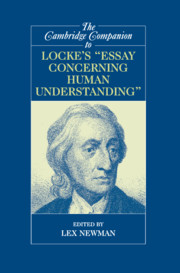Book contents
- Frontmatter
- Introduction
- 1 The Intellectual Setting and Aims of the Essay
- 2 Locke’s Polemic against Nativism
- 3 The Taxonomy of Ideas in Locke’s Essay
- 4 Locke’s Distinctions between Primary and Secondary Qualities
- 5 Power in Locke’s Essay
- 6 Locke on Substance
- 7 Locke on Ideas of Identity and Diversity
- 8 Locke on Ideas and Representation
- 9 Locke on Essences and Classification
- 10 Language, Meaning, and Mind in Locke’s Essay
- 11 Locke on Knowledge
- 12 Locke’s Ontology
- 13 The Moral Epistemology of Locke’s Essay
- 14 Locke on Judgment
- 15 Locke on Faith and Reason
- Bibliography
- Index of Names and Subjects
- Index of Passages Cited
15 - Locke on Faith and Reason
Published online by Cambridge University Press: 28 July 2007
- Frontmatter
- Introduction
- 1 The Intellectual Setting and Aims of the Essay
- 2 Locke’s Polemic against Nativism
- 3 The Taxonomy of Ideas in Locke’s Essay
- 4 Locke’s Distinctions between Primary and Secondary Qualities
- 5 Power in Locke’s Essay
- 6 Locke on Substance
- 7 Locke on Ideas of Identity and Diversity
- 8 Locke on Ideas and Representation
- 9 Locke on Essences and Classification
- 10 Language, Meaning, and Mind in Locke’s Essay
- 11 Locke on Knowledge
- 12 Locke’s Ontology
- 13 The Moral Epistemology of Locke’s Essay
- 14 Locke on Judgment
- 15 Locke on Faith and Reason
- Bibliography
- Index of Names and Subjects
- Index of Passages Cited
Summary
In the “Epistle to the Reader,” Locke famously recalls how the idea for the Essay Concerning Human Understanding originated in a conversation among five or six friends (E: 7). According to James Tyrrell, one of the friends who were present on that occasion, the topic of the conversation was the principles of morality and revealed religion. As a guide to the focus of the Essay, Tyrrell's remark, even if accurate, may seem of dubious value, for Locke himself goes on to describe the subject of the conversation as “very remote” from that of the finished work that he is setting before the reader (E: 7). Nonetheless, there is a sense in which the topic of revealed religion, no less than that of morality, remains close to the heart of Locke's concerns in the published Essay. In a couple of brilliant chapters, Locke shows himself to be deeply interested in issues about the rationality of assent to propositions that are supposed to be divinely revealed. If the subject of the original conversation was remote from that of the Essay, this may have been true only in a limited sense; Locke's interest in the issues was transformed by his discovery of the need for a critique of the human understanding.
- Type
- Chapter
- Information
- Publisher: Cambridge University PressPrint publication year: 2007
- 8
- Cited by

